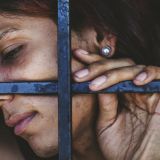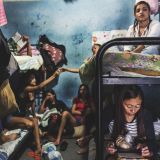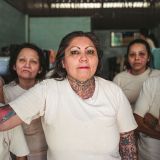Ana María Arévalo Gosen
Días Eternos | Eternal Days
Kirche St. Peter
Ana María Arévalo Gosen’s work offers a harrowing, yet deeply human exploration of the lives of incarcerated women in Venezuela and El Salvador. Born in Caracas, Venezuela, and now based in Madrid, Spain, Arévalo Gosen has photographed the stark realities of life in 15 jails and detention centres since 2017.
The series illuminates the plight of women in remand prisons, where they are often confined for months or years – enduring “eternal days” – awaiting court orders that should, by law, be delivered within a maximum of 45 days. The images reveal the claustrophobic, overcrowded cells and a world defined by violence, deprivation, and a stark lack of space, hygiene, provisions, and medical care. Above all, the series underscores these women’s lack of respect and justice.
Despite the grim circumstances, “Eternal Days” also captures the resilience and solidarity among the women, offering glimpses of hope amid the despair. This courageous and ongoing series not only documents the prison conditions but also reflects on the profound ripple effects on the inmates’ families and Latin American society at large.
Arévalo Gosen, who studied photography at ETPA Toulouse and worked as a freelance photographer in Hamburg, has been documenting the crises in her home country since 2017, particularly focusing on the experiences of women. Her work stands as a powerful testament to the urgent need for systemic change, respect for human rights, and the reduction of inequalities within the criminal justice system. For her work Arévalo Gosen was awarded the Leica Oskar Barnack Award in 2021.
Curated by Lois Lammerhuber / Printed by ![]()
Discover here contributions of ETH Zurich to the Sustainable Development Goal (SDG) 10:
Equal opportunities to reach our full potential
Isabel Martinez
Dr. Isabel Martinez grew up in the suburbs of Bern, Switzerland, to a Swiss mother and Spanish father. Her father experienced the open racism some people showed towards guest workers and immigrants. Her mother was a part-time working mother in the 1980s, an exception rather than the norm at the time.
Isabel was raised in a family that was very much interested and involved in politics. She realised early on that at the end of the day, most topics evolved around inequalities and distribution.
Income and wealth distribution as determinants of inequality
Isabel works in two different, but related research areas. In her work on income and wealth inequality, she studies how much wealth the richest people in Switzerland own. The long-run evolution of income and wealth and their distributions help uncover determinants of inequality. In her work on taxation, she deals with questions relating to taxation changes. This helps develop optimal tax systems, where efficiency and equity concerns are both addressed.
Research on inequality allows people to discuss policy proposals based on facts rather than assumptions about the distribution of wealth. Similarly, understanding how people respond to different taxes allows us to close loopholes and design better tax systems.
Inequality as an opportunity
Inequality, especially wealth inequality, has been increasing in Switzerland since the 1990s. Economics does not give an answer as to how much inequality we should aim for or how much inequality is too much. These are questions that society will have to discuss and address over and over again. How much redistribution between the rich and the poor we want remains a political and philosophical question that society needs to find an answer to with the help of democratic decision-making.
A core principle of modern, democratic societies is that everyone should be able to reach their full potential in life, irrespective of their upbringing, their wealth, their gender, origin, or skin color. We will have to focus more on inequalities in opportunity rather than just looking at inequalities in outcomes.
“I hope that by improving equality of opportunity, inequalities in outcomes will eventually narrow again.”
Dr. Isabel Martinez, Senior Researcher at KOF Swiss Economic Institute at ETH Zurich
An inclusive design competition
CYBATHLON
CYBATHLON is a platform that challenges teams from all over the world to develop assistive technologies suitable for everyday use, with and for people with disabilities. It was conceived by Prof. Robert Riener, who had the idea to bring together researchers, developers and end-users – people with disabilities – to solve everyday tasks. CYBATHLON was founded in 2013 as a non-profit project in the Sensory-Motor Systems Lab at ETH Zurich.
The founders believed that a competition would be the best way to accelerate inclusive design, and to create awareness as to why research and development for the benefit of people with disabilities is important for society.
Challenging teams to develop assistive technologies
The driving force behind CYBATHLON are international competitions. In these events, teams made up of technology developers from universities, companies or NGOs, and a person with disabilities, tackle various everyday tasks with the latest assistive technologies they have developed.
Observed and cheered on by thousands of spectators in a stadium – and now broadcast live or replicated in events around the world – the development teams have raised awareness about obstacles that people with disabilities face in their everyday lives, and how technology can contribute to overcoming these barriers.
The opportunity to take part in a competition is very important for participating teams. It helps them to test their new products in a safe environment, and so improve the design by addressing any weaknesses before they become available on the market.
Reducing inequality is about raising awareness
Consider this scenario: a community meeting is held on the first floor of a local building, and walking up the stairs is the only option to access it. As a result, a person in a wheelchair cannot participate in local politics that affect them. This is simply unjust. New assistive technologies can ensure social inclusion for people with disabilities.
Inclusion can only be achieved if each of us is willing to participate in the process of making public infrastructure accessible to everyone. It is important that inclusion is discussed, and no longer is a stigma. CYBATHLON believes that sharing the stories of people with disabilities paves the way for greater diversity in society. Diversity means discovering and respecting differences between people, as well as other ways of life and points of view.
“One doesn’t have to agree on everything, but mutual respect is key. Perhaps in 20 years, our society will have developed to that point of inclusion”
Prof. Dr. Stefanie Hellweg, Chair of the Ecological Systems Design Institute at ETH Zurich
A global database to untangle social conflict
Lars-Erik Cederman und Luc Girardin
This is a research team that uses computer models to develop theories of global politics, showing how nation states develop and dissolve. Professor Lars-Erik Cederman is a political scientist and has been Professor of International Conflict Research at ETH Zurich since 2003. Luc Girardin is a computer and data scientist with a foot in the social sciences. At the intersection of their expertise, they have developed publicly accessible databases to support research on the participation of ethnic groups in social conflicts.
Ethnic power relations
Together with their research partners around the globe, Lars-Erik and Luc have been exploring the relationship between inequality and conflict. They have compiled global datasets on ethnic groups for the period from 1946 to 2021, through which they glean insights such as opportunities to share government power. Their research shows that regional autonomy and ethnic minorities’ involvement in political decisions are essential for achieving lasting peace. Equally important is a balanced distribution of wealth and basic services.
Open data on social conflict
The data collections that Lars-Erik and Luc have established are publicly available and can be used by politicians, administrators, academics and members of the wider public. The GROWup platform, which is part of the collection, offers a visualization of settlement patterns of politically active ethnic groups around the world from 1946-2020. It maps out information about ethnic groups’ access to executive government power, their involvement in civil war, administrative units, and other variables such as physical elevation or population and gross domestic product by area. Another part of the collection, the Ethnic Power Relation Dataset Family, provides data on ethnic groups’ access to state power, their settlement patterns, links to rebel organisations, transborder links of ethnic kin groups, and intra-ethnic divisions.
Together with research partners from India, one of the most diverse countries in the world, Lars-Erik and Luc’s have combined their data-driven and macro-level approach with studies from the micro or more local level. They found that the perception of inequality is often better at explaining social tensions compared with objectively measured inequalities. This helps researchers and local authorities to understand what feeds perceptions of injustice, which often result in political unrest.
“One very clear thing is that inequality leads to conflict. And if that’s the case, less inequality leads to peace.”
Prof. Dr. Lars-Erik Cederman, Head of the Department of Humanities, Social and Political Sciences at ETH Zurich
open your eyes festival buerau
Botenaustrasse 42
9443 Widnau
Switzerland
Phone: +41 44 218 11 03




